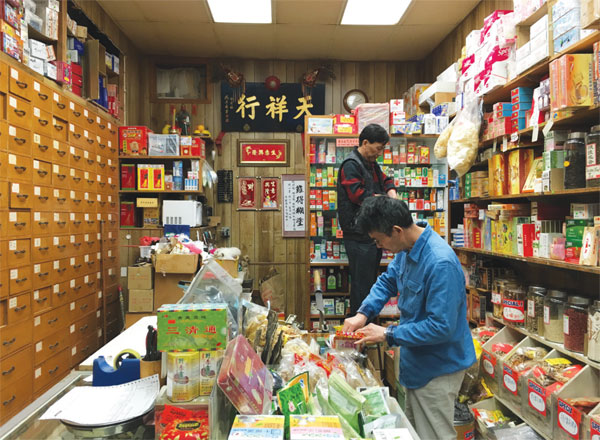Legacy stores hang on, barely

Following the closure of the well-known Chinatown restaurant Empress of China almost a year ago, many longtime Chinese stores in San Francisco and Silicon Valley are complaining about skyrocketing costs there and fearing the same fate.
The landmark six-story restaurant, which had been in operation for 48 years, was forced out of business at the end of 2014 after the property's new owner sought to attract tech companies and charge higher rates.
"The rent has been increasing year after year," said the owner of Tan's Trading Co, a traditional Chinese medicine pharmacy on Washington Street in Chinatown.
| Shop assistants tend to customers at Tan's Trading Co, a traditional Chinese medicine pharmacy on Washington Street in San Francisco's Chinatown. Lia Zhu / China Daily |
The owner, who gave only his last name Li, said the monthly rent was about $2,000 when he first opened the 100-square-foot store 30 years ago; now it has doubled to more than $4,000 a month.
His store was filled with various kinds of traditional Chinese medicine and herbs, including ginseng, ginkgo biloba and cordyceps Sinensis, mostly from China.
"It's harder and harder to maintain the business," he said. "We are losing customers as young people typically do not appreciate the value of traditional Chinese medicine."
"And few young customers come to this neighborhood because it's hard to find a parking space," he added.
A number of traditional Chinese medicine dispensaries have closed in Chinatown in recent years. "I think I'll close the store, too, when I retire," Li said.
On Castro Street in Mountain View, about 40 miles south of San Francisco, is another old-time Chinese store "Hong Kong Bakery". It has been there since 1982, said Janto Yang, 70, a long-time family employee of the business.
"The rent has increased to $8,000 per month, and we couldn't afford another employee," he said. "Now a shop keeper's salary is as much as $3,000 [a month]. We can only afford a part-time assistant for the morning hours."
In his shop, dinner rolls, cocktail buns or cupcakes sell at $2 to $3 each.

There used to be quite a few small Chinese businesses on the street - travel agencies, restaurants, acupuncture clinics - but many of them have relocated or closed because of rising rents.
Once, right across from Yang's shop there was a Chinese bookstore called Alpine Books. It had been in business for about 30 years but recently closed. A Japanese sushi restaurant will open at the location.
"Fancy restaurants and bars are taking over this street," Yang said. "The development of hi-tech companies is a good thing, but it makes it harder for us small businesses to survive."
Mountain View is home to Google and other major high-tech companies. The median price of homes in the city is about $1.2 million, according to Trulia, an online residential real estate website.
"Maybe the bakery will close if the rent keeps rising," Yang said. Four of his children are now technical and financial professionals in the Bay Area. "None of them want to take it over."
To help longtime stores that are facing being priced out, a legacy business historic preservation fund, or Proposition J, was approved in San Francisco on Nov 3.
Qualified legacy businesses - those that have been in operation for at least 30 years - will receive city grants of $500 per full-time employee per year, while landlords who extend the leases of such businesses for at least 10 years will receive $4.50 per square foot of space leased per year.
liazhu@chinadailyusa.com
(China Daily USA 11/11/2015 page2)
Today's Top News
- China's top legislature concludes standing committee session
- Thailand and Cambodia agree to temporary ceasefire
- NPC's 4th annual session slated for early March
- Civilizational links for a fairer world
- Manufacturing in China spurs global growth
- Taiwan lawmakers vote to pass motion to impeach Lai































